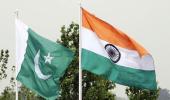The United Nations Security Council's Counter-Terrorism Committee on Saturday called on member-countries to ensure "zero tolerance" towards terrorist activities and vowed to deal with the scourge more vigorously at the end of its two-day special conclave in India.

The meeting, attended by representatives of 15 member countries of the UN Security Council and global counter-terror experts, adopted the "Delhi Declaration" listing the Council's priorities in combating the challenge of terrorism and terror-financing.
In the document, the global body expressed concerns over the increasing use of Internet and other information and communications technologies, including social media platforms, for terrorist purposes.
It said innovations in financial technologies such as crowd funding platforms present a risk of being misused for terrorist-financing and noted with concern the increasing global misuse of unmanned aerial systems by terrorists to conduct attacks against on critical infrastructure.
The Counter Terror Council urged all member-states to ensure "zero tolerance" towards terrorism, consistent with their obligations under international laws, including human rights law, according to the declaration.
India hosted the meeting in its capacity as chair of the Committee. While the second and final day's meeting took place in Delhi on Saturday, the first day's events were held in Mumbai.
The meeting underlined the need for taking "urgent action" to counter terrorism in all its forms and manifestations through the full and effective implementation of various UN resolutions.
The Committee reaffirmed that terrorism in all forms constitutes "one of the most serious threats" to international peace and security, and vowed to contribute further to enhancing the effectiveness of the overall effort to fight the scourge on a global level.
It said terrorism should not be associated with any religion, nationality, civilization or ethnic group, and called on member states' to continue their efforts towards the Comprehensive Convention on International Terrorism.
The Committee stressed the need to effectively counter terror groups like ISIL, also known as Daesh, and Al-Qaida, and their affiliates, and foil their attempts to incite and recruit others to commit terrorist acts.
It strongly condemned the "continued flow of weapons, military equipment, unmanned aerial systems and improvised explosive devices (IED) to and between ISIL, Al-Qaida, their affiliates and associated individuals and groups.
The Committee encouraged member states to prevent and disrupt procurement networks for such weapons and systems.
It also noted the importance of continuing discussions on the misuse of emerging technologies for terrorist purposes in other relevant international forums, including the G20.
While elaborating on various measures to contain terrorism, the committee, at the same time emphasised on the need for respecting human rights and fundamental freedoms.
The Committee emphasised the need for member states and CTED ( Counter-Terrorism Committee Executive Directorate) to continue cooperation with the private sector and civil society for more effective means to counter the use of new and emerging technologies for terrorist purposes.
It recognised the efforts of the UN-affiliated Tech Against Terrorism initiative to foster collaboration with representatives of the technology industry, including technology firms, civil society, academia, and government, to disrupt terrorists' ability to use the Internet
The Committee also referred to relevant UN resolutions to emphasise the need for member states to develop counter-terrorist narratives and innovative technological solutions.
The Council recognised the ongoing work of the Financial Action Task Force (FATF) concerning virtual assets and virtual assets service providers (VASPs).
It also decided to work on recommendations on the three themes of the special meeting, namely 'Countering Terrorist Exploitation of ICT and Emerging Technologies', 'Threats and opportunities related to new payment technologies and fundraising methods' and 'Threats posed by misuse of unmanned aerial systems (UAS) by terrorists'.
UN Secretary-General Antonio Guterres, in message to the meet, called for concerted global efforts to deal with the challenge of the use of new technologies by various terror groups.
"Terrorists and others posing hateful ideologies are abusing new and emerging technologies to spread disinformation, foment discord, recruit and radicalise (people), mobilise resources and execute attacks," he said in his message that was read out at the meeting.










